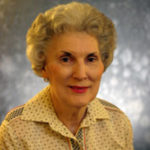Word has been received of the recent death of Sarah Frances Anders, a trailblazer for Southern Baptist women in ministry and past moderator of the Cooperative Baptist Fellowship.
Anders, a longtime sociology professor at Louisiana College, died June 8 at age 90 after a long battle with Alzheimer’s disease. A memorial service was held June 15.
A self-described “Christian woman who loves to teach,” Anders began researching and writing about women in the church in the 1970s. She became both an advocate and a record keeper, compiling statistics on the numbers of ordained women serving in Southern Baptist life taken over by Baptist Women in Ministry in 2005 to provide data for the organization’s State of Women in Baptist Life report last updated in 2015.
Pam Durso, executive director of Baptist Women in Ministry, said as a scholar Anders “addressed the hard realities of sexism and exclusion of women by Southern Baptist churches” and by the early 1980s had “stepped into the role of prophet” to begin laying groundwork for BWIM’s founding in 1983.
“While Sarah Frances was certainly skilled as a scholar, her work went beyond mere research,” said Durso, a former professor of church history. “Her hope was to contribute the advancement of ministry opportunities for Baptist women called and gifted by God, and she certainly succeeded in that hope. With strong passion and unfailing grace, Sarah Frances Anders served faithfully as our prophet, our pioneer and our advocate.”
Anders served as the ninth CBF moderator in 1999-2000, presiding over the 2000 General Assembly in Orlando, Fla., when the Fellowship decided to join the Baptist World Alliance. John Tyler, who served as moderator the previous year, remembered her as “a trailblazer for women in Baptist life.”
“I loved her and her spirit,” Tyler said in an email passing on word of her death.
Anders served on the CBF Coordinating Council — forerunner to the current Governing Board, Ministries Council, Mission Council and Nominating Committee — from 1997 until 2000. Before formation of the CBF in 1991, she broke ground in the Southern Baptist Convention by becoming the first woman to receive the National Distinguished Service Award from the SBC Christian Life Commission. She was also the first woman to be elected vice president of the agency now known as the Ethics and Religious Liberty Commission.
She delivered a theme interpretation at the 1980 SBC annual meeting in St. Louis. Two years later she proclaimed that Jesus would have been an “Equal Opportunity Employer” at a gathering for women in ministry sponsored by Woman’s Missionary Union. She spoke to campus ministers at the SBC annual meeting in 1983.
She also served as chairwoman of the Baptist Joint Committee for Religious Liberty. She received other awards including alumna of the year at Southern Baptist Theological Seminary in 1978 and the T.B. Maston Ethics Award in 1999.
In lieu of flowers, donations are requested to Baptist Women in Ministry, the Anders-Hedgepeth Scholarship Fund at Louisiana College or the Making Way Campaign at First Baptist Church in Pineville, La., where Anders was a longtime member, serving as a Sunday school teacher and a deacon. Burial was in Hasley Cemetery in West Monroe, La.
The 2000 General Assembly moderated by Anders also played a role in a controversy that still hangs over CBF life today. At the meeting, then-coordinator Daniel Vestal estimated that as many as 5,000 Southern Baptist churches could join the CBF in protest of controversial revisions made to the “Baptist Faith and Message.”
That same year Baptist Press hired a young doctoral student named Russell Moore — now president of the Ethics and Religious Liberty Commission of the Southern Baptist Convention — as a correspondent to cover the CBF meeting in Atlanta.
One of Moore’s stories reported the CBF “will continue funding a pro-homosexual organization whose booth was prominently featured at the CBF’s General Assembly and another group whose immediate past president suggested that homosexuals can be called to the pastorate.”
The references were to a sexuality resource produced by the Baptist Peace Fellowship of North America and comments by the past president of Baptist Women in Ministry.
Vestal disputed Moore’s report with a statement saying: “The Cooperative Baptist Fellowship has never issued any statement, taken any action, or spent a single dollar that was intended in any way to condone, endorse or promote the gay-lesbian lifestyle.”
That October the CBF Coordinating Council clarified the organization’s stance with a ban on the hiring of LGBT persons as staff or missionaries. That policy is currently under review in an “illumination project” being conducted by the CBF Governing Board.
An update on the process is scheduled at next week’s CBF General Assembly in Atlanta, with the final report and recommendations expected either this fall or next January.

